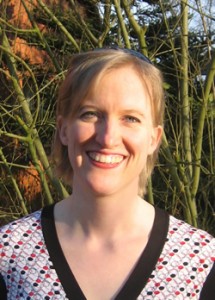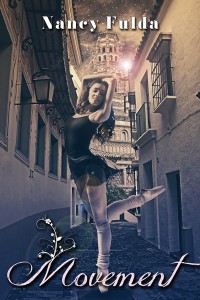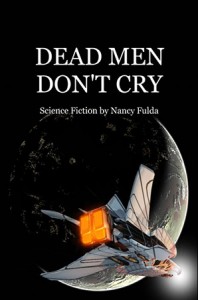 Nancy Fulda is a mother, a sci-fi / fantasy author, and the chief administrator of AnthologyBuilder (a popular site which allows customers to create custom anthologies from a selection of over 1400 different stories by more than 350 authors). Nancy’s stories have appeared in such venues as Asimov’s Science Fiction Magazine and ClarkesWorld. Her Hugo and Nebula Award-nominated short story, “Movement,” appeared in Asimov’s and is available free on Nancy’s website. She lives with her family in Germany. Nancy graciously took time to visit with me and answer some questions. Enjoy!
Nancy Fulda is a mother, a sci-fi / fantasy author, and the chief administrator of AnthologyBuilder (a popular site which allows customers to create custom anthologies from a selection of over 1400 different stories by more than 350 authors). Nancy’s stories have appeared in such venues as Asimov’s Science Fiction Magazine and ClarkesWorld. Her Hugo and Nebula Award-nominated short story, “Movement,” appeared in Asimov’s and is available free on Nancy’s website. She lives with her family in Germany. Nancy graciously took time to visit with me and answer some questions. Enjoy!
* * *
MIKE: Nancy, I appreciate you stopping by! For somebody unfamiliar with your work, how would you describe your fiction? Are there themes or ideas that are recurrent in your stories? Are there specific places, emotionally, historically, or geographically, that you want to take your readers?
NANCY: My work can be described as character-driven science fiction and fantasy. I seldom begin a story with a specific emotional destination in mind; I find it far more fun to journey along with the characters and see where they end up. I sift through a lot of story ideas looking for compelling characters – men and women that I’d be willing to spend an entire novel getting to know. Once I find one, I begin to explore the world that person lives in.
These worlds are often very different from the one we inhabit. “In the Halls of the Sky-Palace”, for example, is set in a cliffside castle whose monarch has stopped aging. “Dead Men Don’t Cry” is set on a world colonized by sleeper ships (and subsequently threatened by FTL imperialism), while “Knowing Neither Kin Nor Foe” is set on a world with no humans at all.
I’m drawn to science fiction and fantasy because these genres aren’t constrained by the rules of the world you and I live in. I can write about dragon riders, artificial intelligence, telepathy, you name it, and as long as I write it well enough, the reader will eagerly join the journey. For an author, that can be a very liberating experience, especially because many aspects of the human condition are difficult to explore head-on. Autism, for example is a highly controversial issue, and one that very few authors can claim to write about with any authority. By inventing a condition for the main character of “Movement” that was similar-to-yet-not-precisely autism, I was able to explore concepts related to sensory processing and neurodiversity that would have been very difficult to render believably in a non-science-fictional context.
MIKE: Sounds fascinating. You’ve garnered significant praise for your writing. You won the Jim Baen Memorial Contest, the Phobos Award, had a pair of Writers of the Future finalist stories, and now you’ve been nominated for a Nebula award. Thus far in your career, what do you  consider your biggest accomplishments?
consider your biggest accomplishments?
NANCY: There are three of them, and at this moment two of them are at kindergarten and one is watching a movie during his day off school.
It might sound strange or even pretentious to cite one’s children as a career achievement, but the older I get the more aware I become that the diverse activities of our lives do not exist in isolation. The energy invested in the creative process is not manufactured out of nothing; it must be drawn from other areas of our lives, and there is always the danger that, as artists, we will draw too much; push too hard; and leave other essential tasks incomplete.
I know mothers who are frustrated at how little time they find to work on their novel, fathers who work a day job and publish regularly and struggle to remain a part of their children’s lives, friends who have lost a marriage over writing-related issues. My sister likens managing career plus family to the task of plate-spinning. You’ve got these incredibly fragile porcelain discs twirling precariously at the top of slender rods, and you’re constantly on the jump to add momentum when one of them starts wobbling. And if you spend too long with any given plate, several of the others will fall.
I consider this an apt analogy. Every accomplishment we achieve in life comes with an opportunity cost. And so the thing I consider most significant about my career is the fact that it has not usurped too many of my other duties. I have been fortunate in managing to write AND parent, and find joy in both.
MIKE: I’ve contended that writing short stories is a good way for an author to develop their writing chops. However, some authors seem to frown on writing short stories. Novels are where it’s at, they say. As someone who’s written short stories almost exclusively, how do you see it? Is there a case for making – or starting — a career writing short stories?
NANCY: Of course. But there’s a case for starting a writing career with three years of meditation at the top of an isolated mountain, too.
I would counsel new writers not to worry so much about what they start with, just so long as they write something. Let it be novels, let it be fanfic; if you follow your own creative enthusiasm, it will eventually become clear to you what the next step should be.
I will say that novels and short stories are entirely different beasts. They’re both made up of words, characters, and plot elements in much the same way that a preying mantis and an elephant are both made up of cells and DNA, but that’s about where the similarity ends. Also, reader expectations and writers’ tool boxes vary a great deal depending on what genre you’re writing in and how old your readership is. So writers who begin a career with short stories should expect a steep learning curve when they try to make the jump to longer work.
And longer work IS more lucrative. Everyone in the industry seems to agree about that. It’s very, very difficult to make a living with short fiction because, as Orson Scott Card so insightfully pointed out, the amount of worldbuilding and emotional investment required for a short story is not that much less than what’s required for a full-length novel.
The case for starting with short stories — and it’s a good one, in my opinion – is that the overall time investment for each story is less. This means that you can submit them faster, get feedback more quickly, and will very likely obtain the encouragement of a sale earlier than would be possible with novels. For a lot of fledgling authors, this encouragement makes it easier to keep going; it was certainly the case with me.
MIKE: We talk a lot about faith and fiction here. In a recent discussion, one reader pointed me to your blog post, “What I Do On Sunday Mornings.” In it, you share about being a Mormon and confess “…a secret corner of my brain is terrified that the moment I mention church or prayer, every reader in scifi fandom will run screaming in the opposite direction and never again buy anything I write.” Conventional wisdom says that writers should refrain from talking about their religion, much less include it in their stories. So why did you decide to “come clean”?
NANCY: That’s an interesting choice of words. I don’t think of it so much as ‘coming clean’ as being willing to be authentic. I’ve never concealed my religion or pretended to be something I’m not. But I also never made a point of talking about it on my blog.
Eventually I realized that it is something I want to talk about now and then. And that I shouldn’t censor myself just because the topic on my mind is faith or scriptures rather than writing or childraising.
It’s a delicate road to walk, of course, because religion is a sensitive topic, and laden with connotations in the public mind that aren’t integral to Christianity itself. Whenever I blog about religion, I try to keep in mind that words like ‘atonement’, or ‘revelation’ — which have a concrete and very specific meaning within my religious community — may not mean the same things to my readers as they do to me. The opportunities for miscommunication are immense.
MIKE: What kind of response did you get after sharing that? Was it as negative as you feared?
NANCY: The response in the blog comments was overwhelmingly positive, but of course there’s a selection bias at work there. I will never know how many people read that post and silently disapproved.
MIKE: What role, if any, does your LDS faith play in your stories? How does it inform your fictional worlds or influence the thematic elements you choose to integrate? Is your faith something you deliberately try to keep out of your stories, or something you intentionally try to incorporate?
NANCY: A bit of both, actually. Many of my stories are rooted in a sense of otherness and immersion in a world and culture utterly different from our own. Religious influence in such stories would not only be brash and heavy-handed, but it would destroy the point for which the fiction was created.
In other stories, like Godshift or The Breath of Heaven, I approached the  topic of religion less obliquely. In both cases I was less concerned with LDS doctrine than with questions of theology in general. “Godshift” postulates a God who takes a more active role in human affairs, and hints at why that might not necessarily be a good thing. “The Breath of Heaven” follows the stream of consciousness of a synthetically intelligent computer system which concludes, through a series of logical inductions, that there must exist a higher morality than that of mere humans.
topic of religion less obliquely. In both cases I was less concerned with LDS doctrine than with questions of theology in general. “Godshift” postulates a God who takes a more active role in human affairs, and hints at why that might not necessarily be a good thing. “The Breath of Heaven” follows the stream of consciousness of a synthetically intelligent computer system which concludes, through a series of logical inductions, that there must exist a higher morality than that of mere humans.
Both stories have received high praise from readers. I suspect this is because they explore meaningful ideas without trying to push any particular ideology.
MIKE: The bibliography of Mormon Speculative Fiction is quite extensive (Orson Scott Card being one of the most prominent and outspoken). Mormon authors even have their own awards, the Whitney awards. Why do you think so many LDS authors gravitate to speculative fiction?
NANCY: I’m actually not sure whether LDS authors are more attracted to speculative fiction than other denominations are. When you consider that the Church has more than 14 million members worldwide, it seems not only likely but inevitable that a couple of us should become prominent in the genre.
Now mind you, I don’t have any hard data on this and would welcome input from those who’ve spent more time thinking about it than I have, but I suspect that the recent apparent upswing in prominent fiction by LDS authors is due in the most part to the emergence of the social web.
In other words, there aren’t any more of us out in the literary trenches now than there were ten years ago, but because of the increasing prevalence of blogs and social media, it’s become a lot easier to find us once you start looking.
MIKE: I’m part of the Evangelical writing community. There is much debate among Evangelical fiction authors about what should characterize “Christian fiction.” Should it be G-rated, free of sex and cursing? Must it contain conversion scenes or articulate a redemptive message? Do similar debates occur in “Mormon fiction” writing circles? If so, are there agreed upon parameters about what should constitute “Mormon Speculative Fiction”?
NANCY: I’m not aware of a strong debate among Mormon authors that I’ve met.
As to the question of what “Christian Fiction” ought to mean: I think we can draw upon other genre labels for guidance. When I think about Science Fiction, for example, I think of stories that expand my understanding of scientific principles and broaden my vision of what science means for humanity. I would expect Christian Fiction to function in a similar way; in other words, I would describe something as Christian Fiction if it expands my understanding of Christianity and broadens my view of humanity.
I’ve been pleased, over the past few years, to notice several award-winning stories and novels that could be characterized as both Science Fiction and Christian Fiction. Science and religion are often portrayed antagonistically, but it doesn’t have to be that way. I enjoy seeing authors affirm that science and religion are able to coexist, and even build upon each other, under the right circumstances.
MIKE: What advice would you give to authors who, like you, are deeply religious but unsure how to publicly navigate the intersection of their faith and their art?
NANCY: Worry less about it.
That’s not a joke. Authors have a tendency to try too hard, to push too obstinately towards a perceived goal. For novice authors, especially, the result is often pedantic and emotionally unengaging. I strongly recommend that authors refrain from trying to build a moral or a specific spiritual message into their work.
Instead, I’d say to authors: Allow yourself to write the stories that flow naturally from your mind and heart. Find characters and situations that speak to your emotions, and explore those situations to see where they lead. Allow themes and symbolic resonance to develop organically.
Some authors will find that religion plays a major role in the stories that emerge this way, and that they are, in fact, writing for a primarily Christian audience. Other authors will find that their audience is broader and that their stories approach religious topics only tangentially. But I think that all authors will find that if they write from the heart, they will feel satisfied with the outcome.
* * *
Thanks so much, Nancy, for visiting. Great stuff! To find out more about Nancy Fulda, you can visit her website HERE.















Nancy, I only wish I had known all this about you when we met last weekend! We could have had some even more amazing conversations. I’m sorry your story didn’t win, but as Walter Jon Williams reminded all of us at the banquet (*intones*) “It’s an honour just to be nominated!” And it really is. I’m looking forward to reading “Movement” soon.
Thanks for an excellent interview, Mike.
Never fear, R.J. — I’m sure there will be many WorldCons and Nebula Weekends in our future. I’ll look forward to catching up with you then. 🙂
“The energy invested in the creative process is not manufactured out of nothing; it must be drawn from other areas of our lives”
Such an important truth, and an easy concept to lose sight of…. thanks for a great interview, Nancy & Mike!
A lot of great stuff to think about. Thanks to you both!
I loved this interview!!! I have recently begun following a few writing blogs by women from the LDS church, and I feel that even though they are LDS, I’m Catholic, and other blogs I follow—like this one— are written by Evangelicals, we are all Friends of Jesus and ought not let our legit differences of opinion on theology take away from that.
Great article. It is a topic that I definitely connect to, how to tell a fantasy story that fits with my Christian beliefs. Thank you Mike and Nancy. Your insight is very helpful.